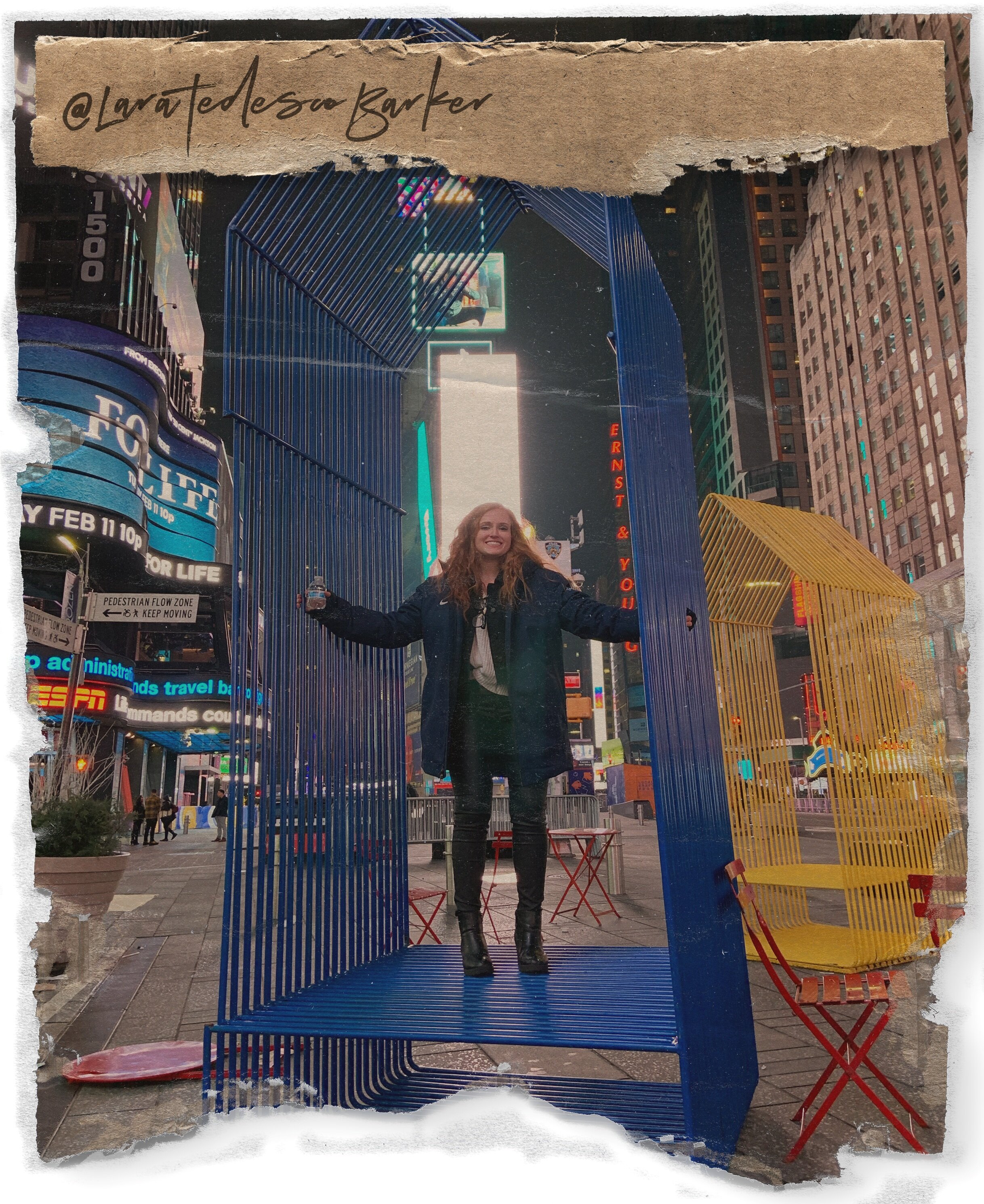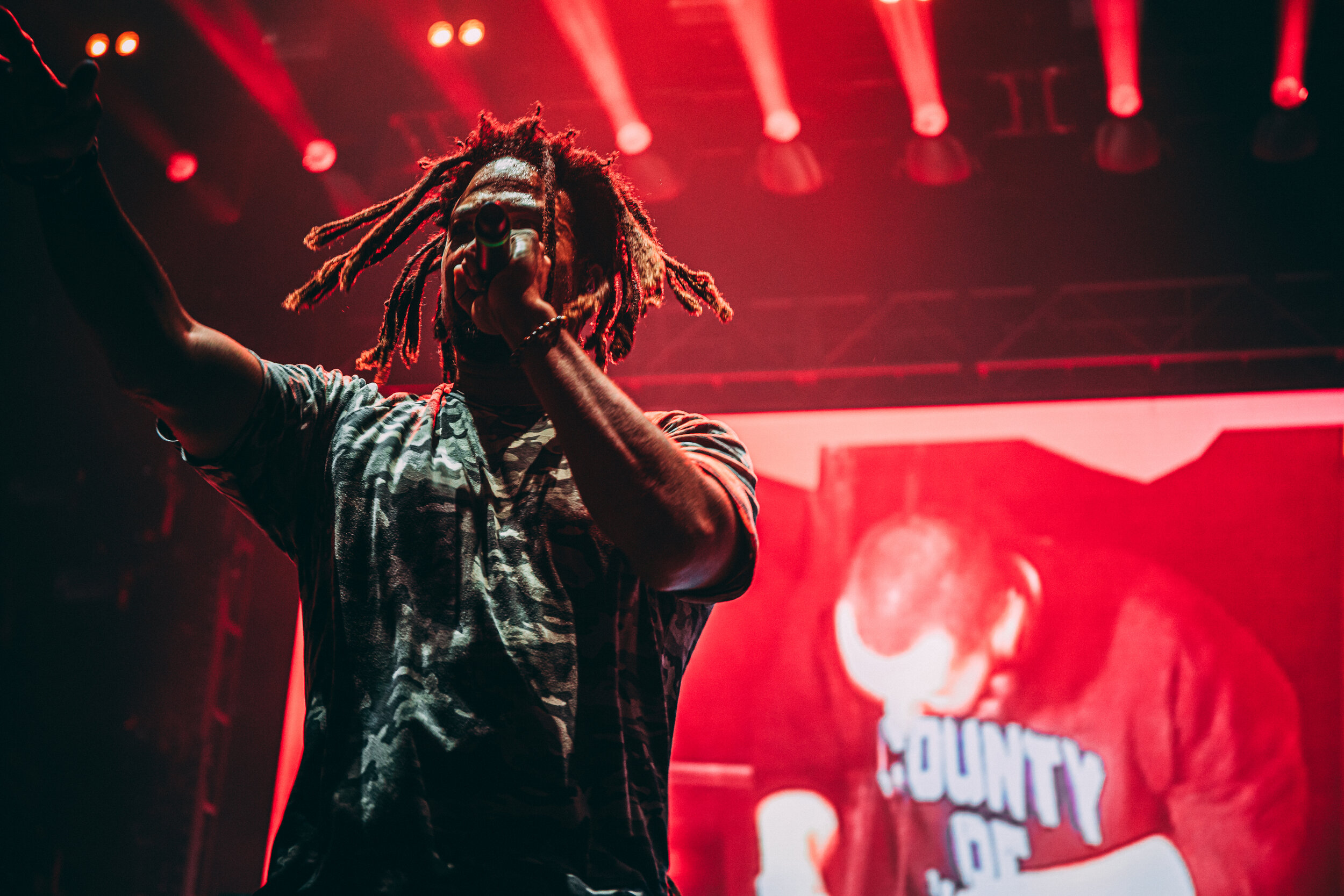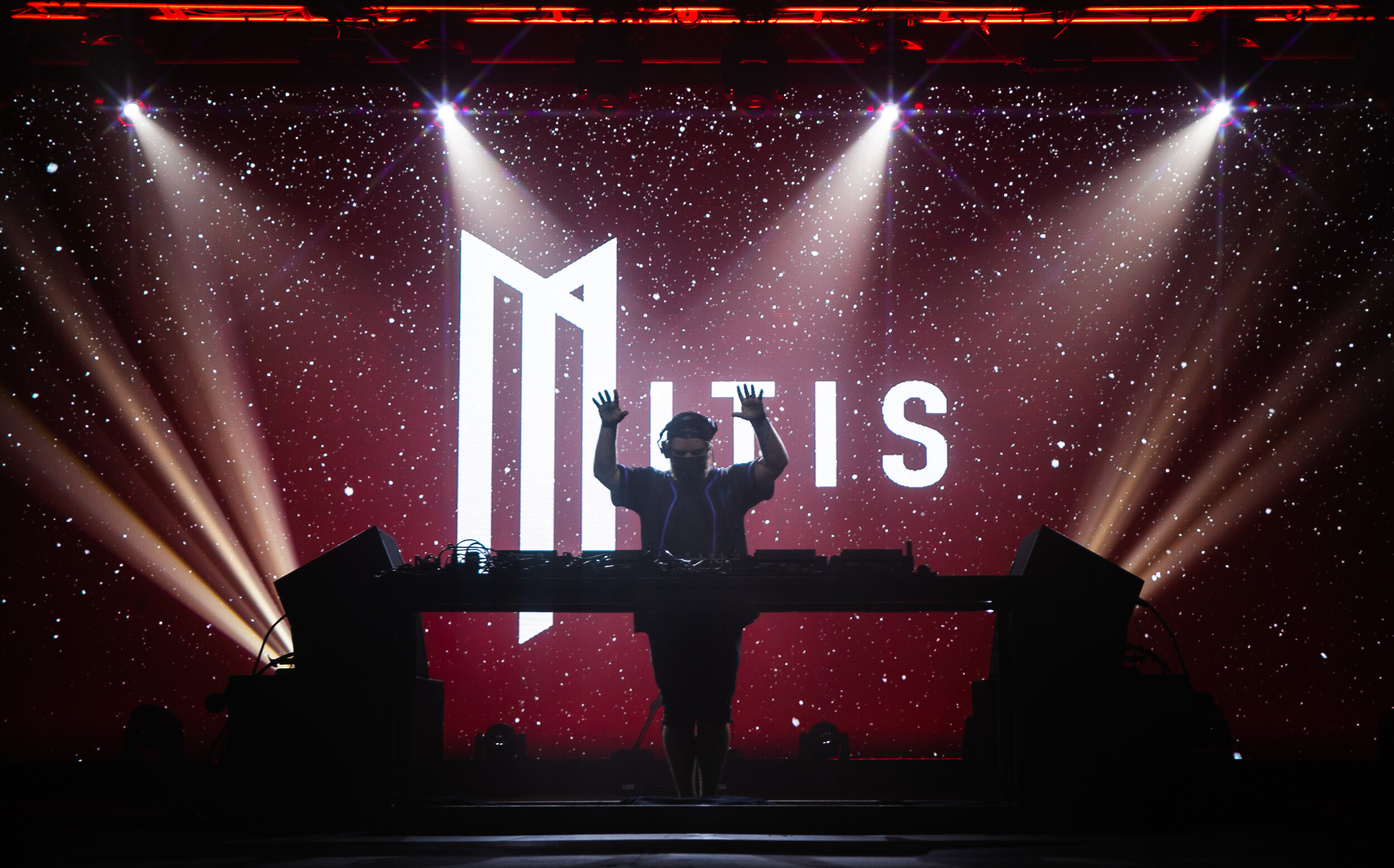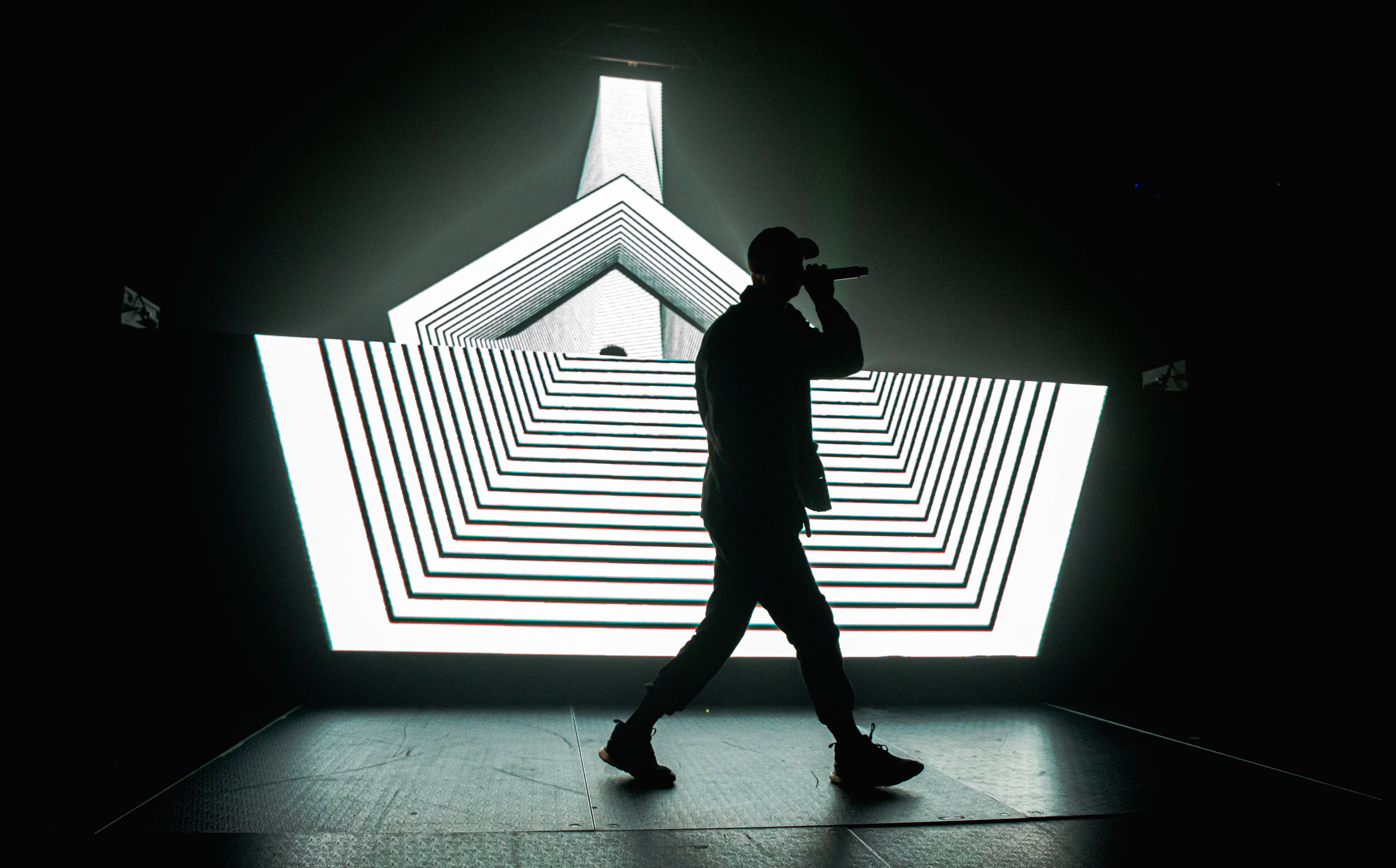Lara Tedesco
As the Hollywood tropes would have it, aspiring creatives move from small towns out in the country to big cities, adapt to the hustle of urban chaos, and ultimately pursue their dreams. Make it or die trying. It’s a hackneyed storyline, but there are occasional grains of truth. Sometimes it’s pretty damn accurate, as with the case of South Carolina-bred shooter Lara Tedesco Barker, whose move to Manhattan last year prompted a string of gigs photographing some of the biggest events in the big city.
We can all agree there’s something triumphant about shooting the same massive music festivals at which you were once a humble GA attendee. Lara’s done all that and more in her relatively short time in NYC, not only covering iconic EDM-centric events like Camp Bisco and HiJinx Festival, but also documenting the local club scene during an adrenaline-fueled stint as principle photographer for the city’s most notorious cover band, Faces For Radio.
As if that weren’t enough, she also bravely shot some of the rawest scenes from the protests in Manhattan earlier this Summer. (She was arrested in the process, sold her mugshot printed on t-shirts, and donated all the profits to charity. Badass.)
Even with live events curbed to a minimum, Lara’s hunted new outlets for creativity. She recently teamed up with Insomniac Events as the sole photographer for MiTiS’ Born livestream festival down in DC this past August, so there are no signs of slowing down here.
For a candid conversation on how it all came to be, dive in.
Coming to New York City from the Carolinas must have been a crazy culture shock. What was the biggest challenge there and how did you overcome it?
The hardest thing is that you're with the best of the best here in NYC. Everyone is extremely motivated and talented. It was definitely hard to get people to take a chance on me, just because the there's so many options out there.
The only way I overcame that was just constantly putting my information out there until somebody took a chance on me, and then once I got my first gig, I was able to get my second gig from that one, and then my third, and then it started snowballing until I had a solid portfolio and some credibility.
You have a reputation for traveling & visiting a ton of different countries. Do you feel like that gave you a new perspective on coming to a city like Manhattan and doing photo & media work there?
Traveling is really what sparked my interest in photography – I don't know that I necessarily would have even done photography if I hadn't traveled a lot. It gave me a sense of motivation to go out and see and do new things, and it made me independent.
What made you want to come to as chaotic a place as Manhattan?
I just always have, since I was little. Long before I got into photography I wanted to live in New York. I've always been drawn to the chaos and the energy, and I know this might sound cliché, but NY has always had kind of a magic about it to me.
Plus, I’m pretty extroverted and I like that every day there’s something different going on here.
You've shot everything from huge EDM festivals like Camp Bisco to bar band shows with local acts like Faces For Radio. Tell me about the difference between those and the challenges associated with each.
To be honest, you really can't even compare them. In fact, for me it's two entirely different mindsets.
Doing smaller, more intimate shows with FFR was cool because I got to know the band super well. Having that connection is actually what I think made the photos better. There was a sense of trust there.
When you're shooting a small show for a local band, what's really important is fan engagement, whereas when you’re shooting a huge festival, it’s so much more anonymous – You're really just there focusing on the artist.
With all those bar band shows, you’re getting up close with that person playing their instrument, making the most of their facial expressions and things like that. Then when you’re at a ten-thousand person venue, a huge festival, you can't just get that close to the artist, so you focus on big-picture stuff, and you can go a little crazier with the editing, hone in on the atmosphere and the overall mood.
I actually prefer doing festivals just because the people who are there . . . they're so excited to be there. Oftentimes they're seeing their favorite artist for the first time. It's just a happy place.
I definitely feel like the smaller shows are actually tougher to shoot.
Oh absolutely. Bar shows at tiny venues are so much more difficult. There's just nowhere to go. People don't even think about it, but like, I'm 5’2, so when I’m in a crowd of people and the stage is only like six inches off the ground, it’s a challenge. You’re not just taking photos – there’s so much else you have to work around. The smaller the venue, and the smaller the show, the harder it is.
That being said, with smaller venues and more local bands, you really get to spend more time with the artist and get to know them. You're not working through a manager – you’re working directly with the musicians themselves.
At festivals, artists show up 15 minutes before their set, perform, and then they're taken back to their hotel. It's not nearly as much of a personal connection.
“I felt like, through my camera, I had a voice to tell people what was going on.”
Tell me about shooting the protests in NYC this past Summer.
Honestly I didn’t have any intentions of getting involved in it to begin with, but a friend of mine happened to post a snap of a pretty large gathering down in Union Square, which is fairly close to my apartment, so I grabbed my camera and just went to see what was happening. It escalated very quickly. There was a lot of bad behavior on both sides, and at that point I was like, “OK, this is this needs to be documented – people need to see what's going on,” because a lot of it took me by surprise. Seeing it on the news is one thing, seeing it with your own eyes it's completely different. And it's important to share all sides of the story.
The more I learned about what was really going on and below the surface, the more I felt like, through my camera, I had a voice to tell people what's going on. I didn't have media credentials – I was just there as a camera person. I could really tell a story on the ground without any sort of any restrictions.
It’s so different though because as a concert photographer, I have a lot of artistic freedom. This was so different. It's not artistic. It’s news. It’s real.
When I first started shooting it, I jumped in editing these photos almost as I would have a concert photo. I was using the same presets and things like that. Then it hit me, and I was like, “This is this is not what this is supposed to look like.” So I got back to pretty minimal editing, just to try to maintain the authenticity of the photos.
With concert photos you can really turn up the vibrancy, mix in heavy contrast, etc. Honestly you can do whatever you want, especially with EDM, because there’s LED screens firing off behind the artists, and there are crazy lasers and things going on. It's expected to be a little bit over the top, because EDM as a genre is so heavy on the production, and all the bells & whistles. With journalistic photography, it's just basic corrections, so it made it a bit more a challenge.
For what it’s worth, I loved seeing your photos on social media when the protests were at their peak. They felt more real than anything on the news.
That was one of the things that really helped me keep going. A lot of people said similar things, like, “I felt more informed by your photos than by what was on the news.” That was really empowering and encouraging, because if I can just raise awareness to one person . . . then it's worth it.
For me, when I was there, there was no story. It was just reality, presented without comment. It was what was actually happening.
Do you feel that shooting the NYC protests helped you improve as a photographer?
Absolutely. I do feel like I've improved.
I mean, there were times, and I definitely prefer to call ‘em protests rather than riots, but there was one point where I was in a literal riot. I was on a block in NYC and in every single direction, all four streets, there was a police van on fire, all of ‘em loaded and about to explode with all the bullets, weapons, and everything else. There was another point that I got maced, so . . . there was just a lot going on at one time. [Laughs] For me, I was kind of like, “OK, if I can do this and I can get usable photos from this, I can do anything.” And it’s weird trying to worry about your camera when your immediate safety is at risk, but yeah, that kind of situation definitely makes you grow as a as a photographer.
What is the best moment you've ever shot, concert or otherwise?
My favorite photo that I've ever taken was actually one of the first photos I ever took. I took it on my first Nikon camera when I was at an orphanage in Ghana. We were out with my school when I was in Semester at Sea, and the crazy thing is a lot of these kids had never seen a photo of themselves, and they’d never seen a camera like that before. I took this photo of this little girl smiling, and she was so happy, so that made me so happy. That's definitely my favorite photo that I've ever taken.
You wouldn’t guess it, but a lot of my favorite photos are not from concerts. They’re more so from projects or gigs when I worked with artists directly. Honestly my favorite thing is when my photo can make someone feel good about themselves. Giving someone back a photo and they're pleased and happy with how they look … that gives me gratification.
What's a project you've worked on recently that you’re really proud of?
One of my good friends, whose been studying & pursuing musical theatre for a long time, got semi-famous during quarantine. He started making all these funny little Tik Toks and they just blew up. So because of that momentum he was finally able to record a single and launch his streaming profile, and I did the photo shoot for his Spotify profile. But he was so happy with how the shots turned out. He was nervous going into it, and through the process of the photoshoot, he became so confident.
I always wanted to do a photo shoot with a guy wearing makeup, so I kind of threw it out there just to see, cause I didn't know if it was something he’d be comfortable with, but he was instantly like, “Oh, my God, yes!” It was cool because we really had the same vision for it. We drew a lot of inspiration from Troye Sivan, and a little bit of imagery from Taylor Swift’s Lover album, channeled those two together, and it came out really well.
So I'm really proud to be a part of his career launch. He's got a brand that he built, but I was able to capture some good photos that he was excited about, so I'm really proud of how that turned out.
“Honestly my favorite thing is when my photo can make someone feel good about themselves.”
Since we're indoors a little more these days, not out shooting shows & festivals, I’m curious — What do you think is the biggest upside to the whole Coronavirus challenge and what have you gotten out of it that could be a silver lining?
Personally it really gave me some time to slow down. My life has been hectic & crazy ever since I moved to Peru, and that was seven years ago, way before this whole NYC chapter. All this really gave me a chance to slow down and focus on the mental health aspect of things.
It also definitely gave me some freedom to do things that I wanted to do that I probably wouldn't have been able to had I been working full time. The biggest thing there is: I wouldn't have been able to go to the protests for two weeks straight.
What advice would you give to your younger photographer self?
When I was studying in college, I definitely was not planning ahead for my long term goals. I was kind of like, “Oh, you know, I'll start when I get to New York.” That’s the wrong attitude. Start immediately. As soon as you know you want to do something, go for it. Work hard at it.
On that note, I would also tell myself to be more confident. I was so nervous going into every show. I swear I was usually more nervous than the person performing. I would definitely say to trust yourself more.
“I want to capture the excitement. I want people to have that memory frozen forever in a tangible way.”
What do you think helped you improve over time?
I was such a beginner when I started, and I didn't fully understand my camera. I remember going into that first [Stephen] Talkhouse show like, “I don't know what I'm doing at all.” But a lot of the things I did to improve were intentional. When I first started out, I would go back through my photos after a show and critique myself. I’d be like, “OK, what did I do well with at this show, and what do I need to do for next time?” That's one of the things that really helped me improve: not just being done with the photos once I sent them in.
For me, this is such a dream. I wanted it so badly that I was always like, “OK, what do I need to do to get my goals achieved?”
I’ve loved the collages you’ve put up recently as well. I just feel like I'm at a music festival looking at them.
I do love the collages. I've only seen one other person do it, and theirs is totally different anyway. I had so much fun doing it. It's kind of like a puzzle almost.
With those, I want to capture the excitement. When you're at a concert, it's so hard to take everything in. I want people who were there to look at my photos and be like, “Oh, yeah, I remember when that happened!” I want them to be able to have that memory sort of frozen forever in a tangible way.












